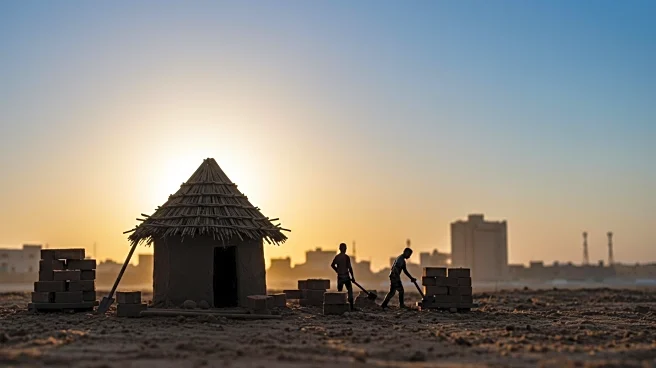What's Happening?
In Sudan, approximately 1.2 million people have returned to Khartoum since the end of 2024, following the recapture of the capital by the Sudanese army from the Rapid Support Forces (RSF). The conflict, which began in April 2023, has displaced over 12 million people and resulted in more than 40,000 deaths. The infrastructure in Khartoum has been severely damaged, with hospitals and essential services dismantled. Despite the army's claim of recapturing the capital, residents face critical shortages of fuel, water, and medical supplies. Efforts are underway to rebuild the city, focusing on restoring basic services and clearing war remnants.
Why It's Important?
The return of displaced Sudanese to Khartoum marks a significant step in the country's recovery from a devastating conflict. The rebuilding efforts are crucial for restoring normalcy and providing essential services to the population. However, the extensive damage and ongoing insecurity pose challenges to reconstruction. The situation in Khartoum highlights the broader humanitarian crisis in Sudan, affecting millions and requiring substantial international aid and support. The rebuilding process is vital for stabilizing the region and preventing further displacement and suffering.
What's Next?
Sudanese officials estimate that the reconstruction of Khartoum will cost billions of dollars. The focus is on restoring electricity, water, and other basic services. However, the ongoing conflict and lack of a single trusted governing partner may discourage international donors from contributing to the rebuilding efforts. The returnees face insecurity, with acts of robbery and illegal occupation of homes continuing in the absence of proper civil order. The situation requires coordinated efforts from the government and international community to ensure sustainable recovery and peace.
Beyond the Headlines
The return to Khartoum amidst destruction raises ethical and legal questions about the protection of civilians and the responsibility of warring parties. The lack of services and increased militarization create conditions for organized crime, affecting the safety and well-being of residents. The rebuilding process must address these deeper issues to ensure long-term stability and security. The situation in Khartoum reflects broader challenges in post-conflict recovery, emphasizing the need for comprehensive strategies that prioritize human rights and community resilience.











